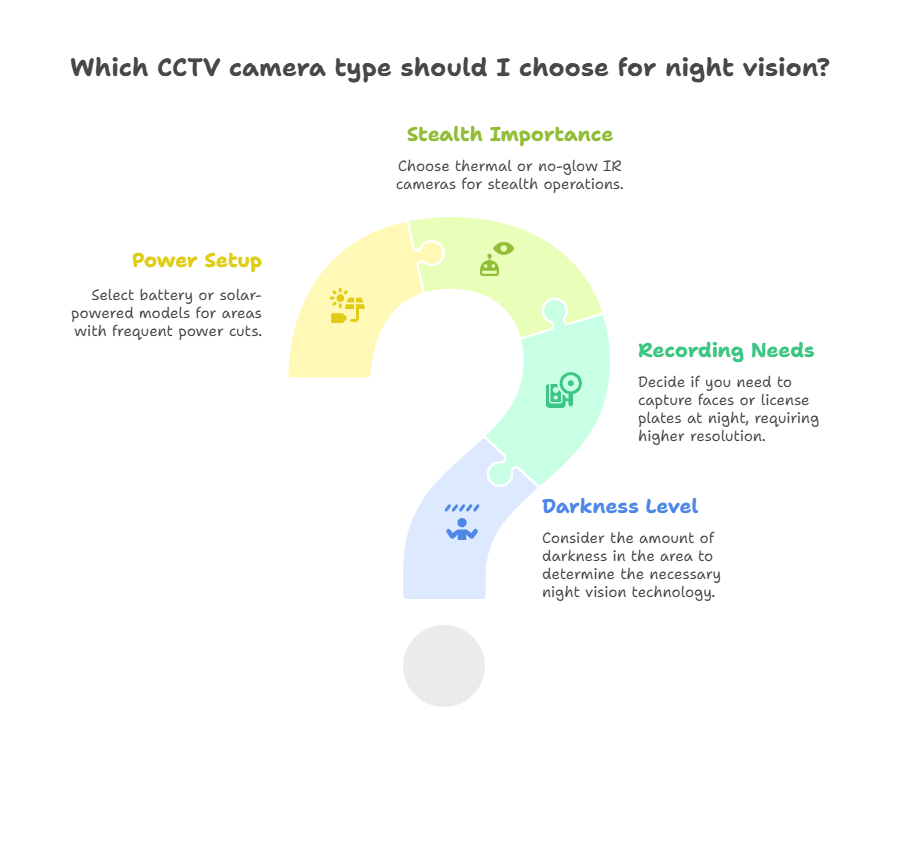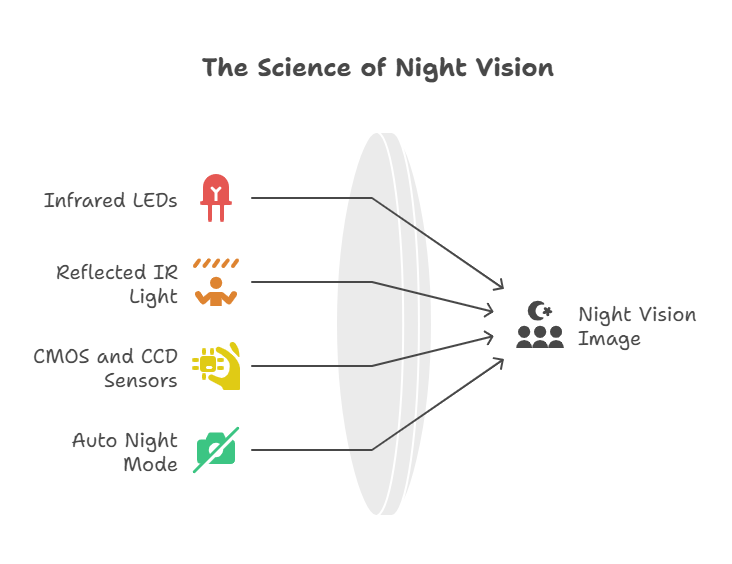Security must work tirelessly to protect both your home and business. On the other hand, we can commonly hear customers say: Can CCTV cameras work in the dark? Most misdemeanors have a course being staged under conditions of poor visibility, be it after sundown or during power outages, or maybe dim-lit basements or alleys.
Gone are the days when only old-fashioned questions of human observation existed. In the dim evenings of a while ago, the operations of CCTV systems with faint image capture capabilities could still watch over your environment. In this article, we will cover how CCTV cameras work in the dark, the technology involved, and what you should consider when setting up a system in a rather dark spot.
Can CCTV Cameras Work in the Dark?
I want to say, some cameras can do their work in absolute darkness, yet, sadly, there are only a few of such cameras. Nighttime capability depends upon the camera in question and whether it employs night vision or infrared technology (IR). Without such provisions, it is difficult for the camera to get its images in very low illumination and may even skip important details sometimes.
Standard, older CCTV cameras relied heavily on ambient light to function. The footage would often be grainy, blurry, or completely black during nighttime. But modern surveillance systems have made a leap forward. With infrared LEDs, starlight sensors, and thermal imaging, these advanced devices are designed to deliver round-the-clock monitoring—even when there’s no visible light at all.
How Do CCTV Cameras See in the Dark?
Night-vision cameras operate on a principle relying on infrared light, which humans are unlikely to observe; a primitive sketch of their case looks like.
- Infrared LEDs: Small bulbs emitting the invisible infrared light surround the lens.
- Reflected IR Light: Having bounced off the objects in the environment, the wave is picked up by camera sensors to create an image.
- CMOS and CCD Sensors: These sensors treat the reflected IR light and turn it into black-and-white images.
- Auto Night Mode: Whenever low light is detected, the camera automatically turns color mode off and turns on monochrome mode to facilitate viewability.
This entire process happens seamlessly, allowing you to view or record footage without the need for additional lighting.
Different Types of Night Vision Technology
Not all night vision is created equal. Depending on your needs and budget, there are several types of technologies to consider:
- Standard Infrared (IR) Cameras: These give solid night footage in black and white and are best for most residential and small business setups.
- Starlight Cameras: They can operate in extremely dim-light conditions and can even generate color images at night with ambient light.
- Thermal Imaging Cameras: These don’t detect light but recognize heat sources, so they are apt for complete absence of visibility, like forest perimeters and smoke-filled spaces.
- Floodlights Cameras: These utilize motion detection to turn on built-in floodlights that offer better color visibility.
Each has its pros and cons, but all aim to solve the same problem—ensuring your CCTV camera can work in the dark.
Best Practices for Installing CCTV in Dark Areas
If you’re setting up surveillance in a poorly lit environment, follow these practices for optimal performance:
- Strategic Placement: A camera should be set at important entries where reflections could occur, either from shiny surfaces or from anything that blocks light, such as tree leaves or walls.
- Avoid Glare: Positioning should be such that the streetlights or shiny surfaces do not overexpose the film.
- Add Additional Lighting If Required: Motion-censored lights can scare off intruders and help cameras operating in low-light conditions to acquire better-quality footage.
- Keep It Checked: Periodically check nighttime footage to verify that all is going very well.
Maintaining Night Vision Performance

Maintenance of the night vision CCTV system is very important, such as installation. Time and again, dust or a thin layer of grime accumulates on the camera lens, obstructing the transmission of infrared light, hence lowering image clarity, so to speak. Keeping the IR LEDs in check is another matter; even in the case of a few burnt-out LEDs, visibility in the dark is compromised.
In case you want your camera to function better in low-light and to have all those recently released features and security enhancements provided by the camera manufacturer, keeping your camera updated with the latest firmware is a must.
What to Consider Before Installing a Night Vision CCTV System
If you’re wondering can CCTV cameras can work in the dark, ask yourself a few key questions before buying:
- What is the level of darkness in the area? Total darkness or just low ambient light?
- Do you need to record faces or license plates at night? You’ll need a higher-resolution IR camera.
- Is complete stealth important? Then go with thermal or no-glow IR cameras.
- What’s your power setup? Consider battery or solar-powered models for areas prone to power cuts.
These considerations help you select a system that doesn’t just meet your expectations but exceeds them.
Can CCTV Cameras Work in the Dark?
In conclusion, they say that the CCTV system might not work if it is put in the dark against any negative interference to perform its functions to capacity. Be it infrared, starlight, or thermal imaging, top systems these days would ensure the best quality of footage irrespective of day or night.
It is not just technology that matters, however. A surveillance system that survives any power or light failure and surely catches incidents requires a high level of expertise, including mere installation, upkeep, and choice of the perfect system.
Need Help Choosing the Right Camera?
If you’re looking for the most effective CCTV camera installation in Chandigarh, CCTV Hub Tech is here to help. As experienced CCTV dealers in Chandigarh, we provide tailored solutions with night vision, thermal, and AI-powered surveillance technology for homes, offices, and industrial properties. Let us help you build a security system that never sleeps.

